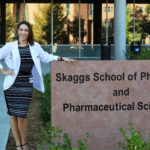October: Breast Cancer Awareness Month
By Megan K. Fischer with Peter J Rice
Breast cancer directly and indirectly affects countless people each year. It is the most common cancer in women regardless of race or ethnicity and the 2nd most common cause of death for women. On average, a woman has a 12% chance of developing breast cancer at some point in her life. While this disease is known for affecting women, it can also occur in men. Men have a 1 in 1000 risk (0.1%) of developing breast cancer.
Breast cancer occurs when cells in the breast grow out of control without the body being able to regulate growth.
The type of breast cancer is determined by the types of cells that are growing out of control. There are 2 main types of breast cancer, invasive ductal carcinoma and invasive lobular carcinoma. Classification is based on whether the cancer (carcinoma) is spreading (invasive) and its location. The breast is made of 3 parts: the lobules (glands that make breast milk), ducts (tubes the take milk to the nipple), and connective tissue (the bulk of the breast holding everything together). The term invasive ductal carcinoma means the cancer cells grow in the ducts and spread to other areas. Invasive lobular carcinoma means the cancer cells start in the gland and spread to other breast tissues nearby.
Important symptoms that can suggest breast cancer include: lumps in the breast or underarm, thickening or swelling of the breast, irritation or dimpling of the breast skin, and pain. Not all of these symptoms need to be present in a person with breast cancer. Even just one symptom warrants further examination from a healthcare provider.
There are some people who are at a higher risk of developing breast cancer. Just because someone is at a higher risk does not guarantee that they will develop breast cancer. Women in general are at higher risk than men. Genetic mutations have also been linked with an increase risk, though only 5-10% of cancers stem from gene mutations. BRCA1 mutations increase risk up to 65% and BRCA2 mutations increase risk by 45%. Additionally, age is an important factor. Women over the age of 50 have an increased risk of cancer. A family history of breast or ovarian cancer will also increase risk.
Living a healthy lifestyle and regular screening can reduce your risk of breast cancer. Maintaining a healthy weight, exercising regularly and limiting alcohol helps keep the body and immune system strong. There are multiple types of screenings for breast cancer. The main one that all women and men should perform is the self breast exam. Use your hands to feel for lumps or changes in breast tissue. Start on one side of the breast and move in a clockwise fashion until the entire breast has been checked. Report any changes, lumps, or pain felt to a health care provider. This should be conducted monthly.

Breast Cancer Awareness
Mammograms are also used to detect breast cancer in women.
A mammogram is a front X-Ray machine that takes a picture of the breast tissue. Normally, these screenings start at the age of 50 and are repeated every 2 years. In women with a higher risk of breast cancer, screenings can begin earlier and be repeated more frequently. Discuss with your health care professional about beginning before 50. Mammograms are normally covered by insurance every 1-2 years with little to no cost. The CDC offers free or low cost mammograms to certain qualifying patients.
Stay aware and start your screening process. Screening allows cancer to be detected earlier, making it much easier to treat. Ask your local community pharmacist or prescriber for more information regarding screenings and ways to reduce your breast cancer risk.
References
https://www.cancer.org/cancer/breast-cancer.html
https://www.cdc.gov/cancer/breast/index.htm
About Megan K. Fischer

Megan K. Fischer
Megan Fischer is a Doctor of Pharmacy student with University of Colorado Skaggs School of Pharmacy and Pharmaceutical Sciences. A student by day and a workhorse by night, Megan works as a student researcher at her school of pharmacy and as an intern pharmacist at Poudre Valley Hospital. She is an active member of the American College of Clinical Pharmacy (ACCP) and Industry Pharmacists Organization (IPhO). She graduated from University of Colorado at Boulder with a degree in Biochemistry and minored in Chemistry and Economics. Megan plans to work as a clinical pharmacist specializing in critical care or infectious disease after graduation. In her free time, she hikes and camps all the while trying to find moments for a nice nap.











